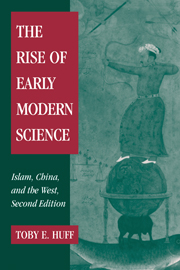Book contents
- Frontmatter
- Dedication
- Contents
- List of illustrations
- Preface to the second edition
- Preface to the first edition
- Acknowledgments
- Introduction
- 1 The comparative study of science
- 2 Arabic science and the Islamic world
- 3 Reason and rationality in Islam and the West
- 4 The European legal revolution
- 5 Madrasas, universities, and science
- 6 Cultural climates and the ethos of science
- 7 Science and civilization in China
- 8 Science and social organization in China
- 9 The rise of early modern science
- Epilogue: educational reform and attitudes toward science in the Muslim world and China since the eighteenth century
- Selected bibliography
- Index
1 - The comparative study of science
Published online by Cambridge University Press: 05 June 2016
- Frontmatter
- Dedication
- Contents
- List of illustrations
- Preface to the second edition
- Preface to the first edition
- Acknowledgments
- Introduction
- 1 The comparative study of science
- 2 Arabic science and the Islamic world
- 3 Reason and rationality in Islam and the West
- 4 The European legal revolution
- 5 Madrasas, universities, and science
- 6 Cultural climates and the ethos of science
- 7 Science and civilization in China
- 8 Science and social organization in China
- 9 The rise of early modern science
- Epilogue: educational reform and attitudes toward science in the Muslim world and China since the eighteenth century
- Selected bibliography
- Index
Summary
The modernity of science
In the present world, science and its offshoots appear to be the epitome of modernity. The scientific method of treating every conceivable natural, human, or social malady is everywhere in evidence. If the scientific approach has not been applied to the problem at hand, the treatment and analysis are thought to be either defective or suspect. This state of affairs is not bereft of moral critics who think that science itself has too much power or that the strictly scientific point of view, especially in medicine, claims too much, is overly confident, arrogant, and even capable of reaching false diagnoses. In the Western world there are those who think that science itself is a “social problem.” To them the technological products of science – excessive levels of radiation released into the atmosphere of local communities, the inadequately monitored use of pesticides, the general degradation of the natural environment caused by the dumping of toxic substances, and even global warming – are all to be laid at the door of modern science and technology. Nevertheless, alternative forms of knowledge – those derived from religion, mysticism, or occult sciences such as astrology – must offer their own defenses against the prevailing scientific posture. If they are to be accredited, these alternatives must be shown to produce their results and achieve their effects in ways that are consistent with either scientific ignorance (“about this we have no knowledge”) or scientific wisdom (“this outcome is perfectly conceivable within expanded parameters of our present scientific knowledge”).Indeed, it is common to refer to the privileged status of scientific knowledge in the modern world. This phrase means several things. First, it implies that the knowledge claims of scientific experts are given pride of place in public discussion and, above all, in matters of health, public and private. Second, expert witnesses, who are reputed to be scientific experts, are permitted to testify in courts of law regarding arcane and abstruse topics that laymen are hard-pressed to understand. In such circumstances these experts are permitted to use their scientific knowledge to establish possible facts as well as the probable causes of events.
- Type
- Chapter
- Information
- The Rise of Early Modern ScienceIslam, China and the West, pp. 8 - 46Publisher: Cambridge University PressPrint publication year: 2003

